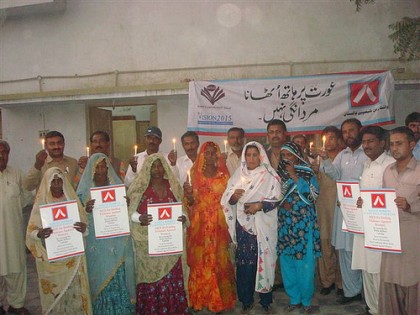Pakistan as a developing country has yet to go a long mile before it stands beside all the developed countries. The women make more than half the population of the country, but sadly they are not treated well. This year on March 8th, Pakistan also celebrated “the women’s day” in an attempt to make a change in their lives showing a ray of hope to every female. Domestic violence is one the harsh realities of a Pakistani women. Activists who work for women cause say that many women remain in violent relationships because they believe they must obey their husbands and that divorce is a shame.

Candle light vigil during the White Ribbon Campaign in Umerkot, Pakistan. (Image by Flickr user CWGL. CC BY)
According to a report of NGO White Ribbon Campaign (WRC) Pakistani women are subject to increasing abuse. Increased cases of violence are being reported each year in Pakistan. According to the report: “sexual harassment at the workplace, abuse, beating, and rape were some of the forms of violence against women.”
One third of women in Pakistan are uneducated and have very little concept about making their own choices. The police often snub the women and refuse to register cases unless there are obvious signs of injury and judges at times seem to sympathize with the husbands.
Dr. Farzana Bari, acting director of the Centre of Excellence in Gender Studies at Quaid-e-Azam University, states that commemorating the day around the UN theme “Equal rights, equal opportunities: progress for all” seems to be a fallacy “when rights and opportunities are simply disappearing from the lives of everyone; men, women and children.”
Are we then asking for equality in police torture recently shown on television channels? Equality in sharing the brutality of the factory-owner, who kidnapped, chained and tortured a laborer in Gujranwala? Do we want to share the humiliation of bus hostess in Sialkot? Do we want to have equality in the fate of Shazia, the young domestic servant who was tortured to death?
Global Voices author Sana Saleem at the Dawn Blog states that:
For a society to progress, human rights have to be guaranteed, with the assurance that rights are maintained without gender bias or discrimination. Gender-based violence reflects and reinforces injustices and compromises the health, dignity, and liberty of its victims.
In Pakistan a proposed bill to ban domestic violence is being debated in the parliament. Women rights activists and some Islamist lawmakers are chasing it. It remains to be seen who wins. Pakistani blogger Baaghi questions the efficacy of the judiciary as there is no strong law to protect the women:
At the end of the day, dispensation of justice begins from acknowledging an act as crime. If domestic violence is not even considered a punishable crime, how can one expect to get redress from the system? When acid throwing is not listed in the penal code as a form of offence, how one can even hope for it to be punishable? And when even some of these crimes against humanity are listed as crimes, our rotten system just refuses to acknowledge that it ever happened.
Pakistani women can achieve their goal by joining hands together and motivating each other. Educate women which will ensure awareness of what is happening to women around the world today is an essential step towards improving their situation. It is a surprising fact that women are made to do some of the things simply because of the fact that they are women. No one can change the world by themselves, but many people doing a little can make a real difference in the society. The nations that put up with the ill-treatment of women must know that they are being watched. A good number of governments are run by men who may not have the wish to transform things unless the world makes some noise.
The things which we can do at our level are:
- We can educate ourselves.
- We can be supportive of organizations that promote women's rights.
- We can join hands and make our governments know that we are conscious of what's happening around the world and we will not allow it.
- We can write to foreign embassies about the violence so that they can help us in promoting awareness.
- We can increase awareness.
- We can read about it.
- We can write about it.
- We can blog about it.
- We can talk about it.
|


